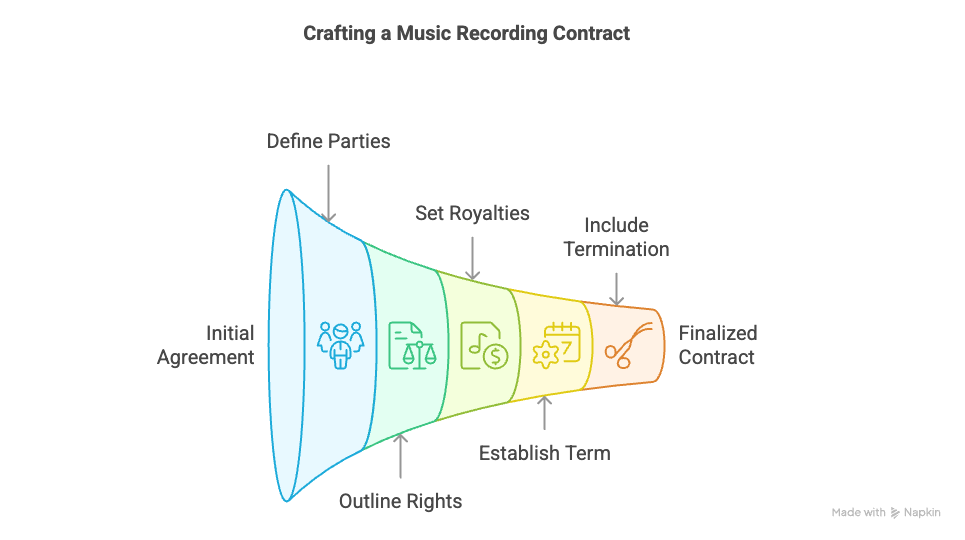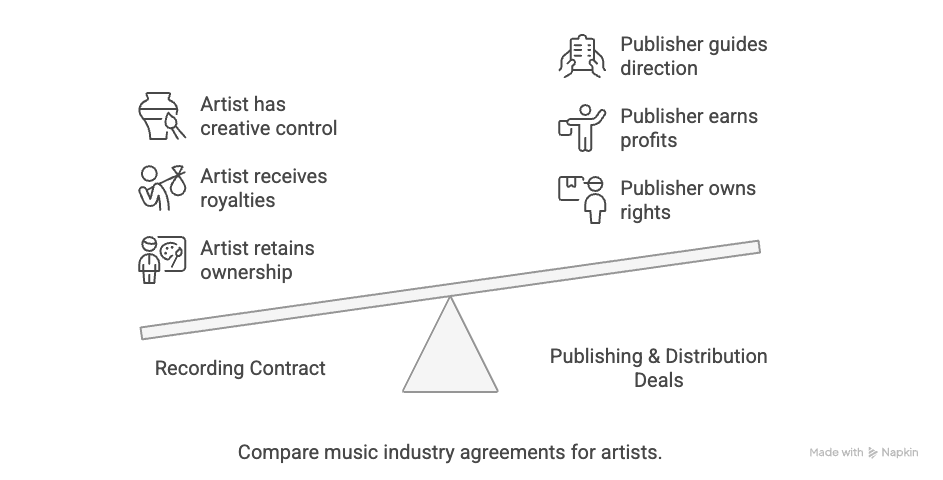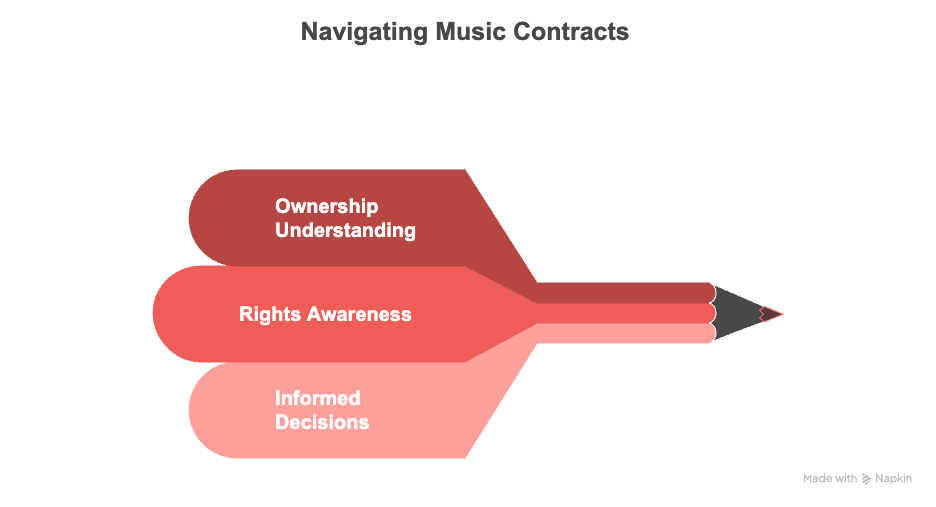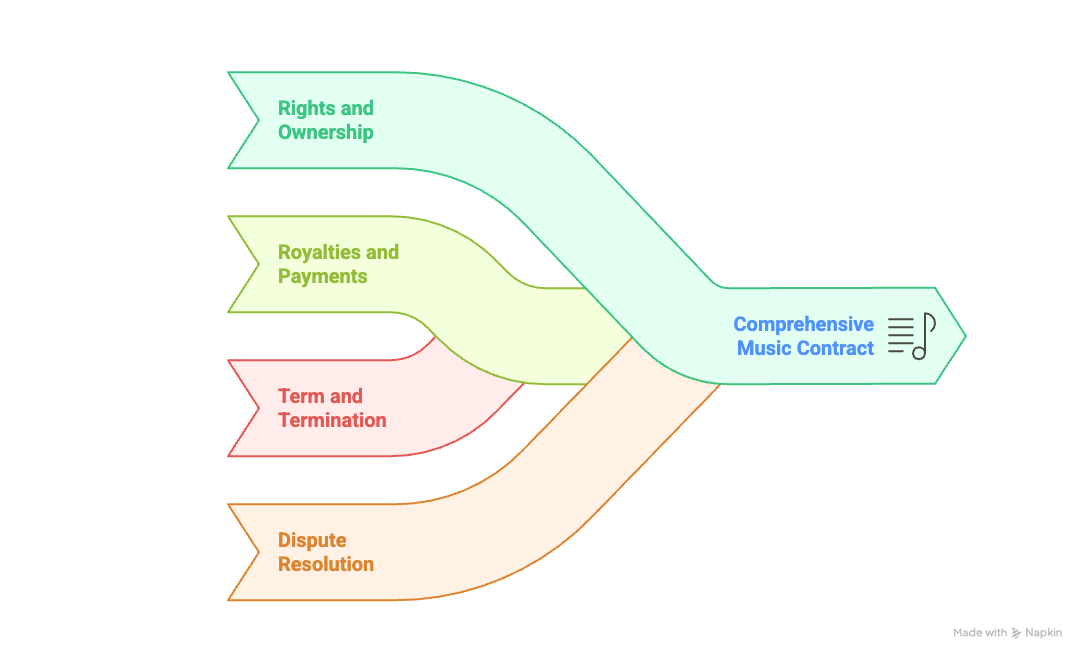
How To Write A Music Recording Contract That Protects Rights
Last Updated on May 11, 2025
In today’s music industry, a handshake won’t cut it. Whether you're an artist stepping into the studio or a producer managing a full recording project, a written agreement is non-negotiable. A legally sound music recording contract does more than outline terms-it protects your rights, clarifies revenue splits, and ensures everyone walks away with what they’re owed.
This guide walks you through exactly how to write a music recording contract, including real clause examples and expert-backed tips.
Before You Start: Make These Key Decisions
Before drafting anything, align on these fundamental deal points:
1. Scope of the Recording
Are you recording a single? An EP? A full album? The size and nature of the project will shape how many rights and royalties are at stake.
2. Exclusivity & Term Length
Will the artist be exclusive to this label or producer during the term? For how long? Define the commitment clearly.
3. Master Ownership
Who will own the final master recordings? Artist? Label? Shared ownership? This decision is central to long-term control and income.
4. Royalty & Payment Structure
Will payment be upfront, percentage-based, or a hybrid? Are costs like mixing and mastering recoupable? Map out revenue sharing in plain terms.
Must-Have Clauses in a Music Recording Contract
These are the core sections every solid contract should include:
1. Recording Scope & Deliverables
Define the number of songs, expected deadlines, file formats, and production responsibilities.
2. Ownership of Master Recordings
Spell out who owns the masters. If shared, indicate percentages and usage limits.
3. Royalties & Revenue Splits
Clarify how income is split from streams, downloads, licensing, and sync deals. State when and how payments are issued.
4. Term, Renewal, and Termination
Specify the start/end dates, any auto-renewal terms, and conditions for early termination.
5. Force Majeure & Legal Jurisdiction
Include clauses for unforeseen events (e.g., illness, studio closures) and state which provincial law governs the deal.
Sample Clause Language (Simplified)
Here are basic examples you can adapt:
Royalty Split Clause
"The Artist shall receive 40% of Net Revenue from digital sales and streaming, payable quarterly. Label shall retain 60% and cover distribution expenses."
Master Ownership Clause
"All master recordings shall be jointly owned 50/50 by the Artist and Label. Either party may license the masters with written consent."
Termination Clause
"This agreement may be terminated by either party with 30 days’ written notice, provided all financial obligations have been fulfilled."
Common Mistakes to Avoid while creating Music Recording Contract
- Using a one-size-fits-all template without customizing for your deal structure
- Leaving out ownership details, especially for joint projects
- Not defining payment schedules, leading to delayed or missed payments
- Skipping force majeure clauses, which can protect both parties from uncontrollable disruptions
Do You Need a Lawyer?
For small collaborations or demos, a clear contract may be enough. But for commercial releases, high-value royalties, or label deals, always have a lawyer review your final draft—especially if there’s significant money or ownership on the line.
Look for music-focused legal professionals in Canada or use platforms like Creators Legal or MusicLawContracts.
Download a Ready-to-Use Template
If you're ready to get your deal in writing, start with our professionally drafted template. It’s free, editable, and includes all the clauses discussed here.
Download the Free Music Recording Contract Template
Ready to apply what you've learned? Get instant access to the Music Recording Contract PDF - free, editable, and built for Canadian businesses. No sign-up required.
Frequently Asked Questions
Answers to common questions about How To Write A Music Recording Contract That Protects Rights.
Can I write a music recording contract myself?
Yes, especially if you use a reliable template. Just make sure to include essential clauses like ownership, royalties, term, and termination rights.
Do I need a different contract if I’m both the artist and producer?
Yes. You should define your dual roles clearly to protect your interests on both creative and business sides.
How do I define royalty splits in the contract?
You can include a clause stating exact percentages and payout schedules. Be clear about gross vs. net income.
Is this contract valid if signed digitally?
Yes. Under Canadian law, digital signatures are legally binding if both parties agree to electronic contracting.
What happens if the artist or label wants to terminate early?
Your contract should include a termination clause that outlines notice periods and financial obligations if the deal ends prematurely.
Should I include recoupment terms?
Yes. If you're covering costs (like studio time or promotion), include a recoupment clause to recover those expenses before royalty payouts begin.
What if I want to license the song later?
Ownership clauses should define who controls licensing decisions. Joint ownership requires mutual approval for third-party use.
Can I use this contract for non-Canadian deals?
While written to reflect Canadian standards, it’s adaptable for other jurisdictions with minor legal adjustments.
How do I protect myself if the artist doesn’t deliver the tracks?
Add a clause specifying delivery deadlines, performance expectations, and consequences for non-delivery.
Can I reuse this contract for future projects?
Yes. With minor edits, you can reuse this format for new recordings, sessions, or different artists.
Explore More in Creative Digital Contracts
Discover curated templates in Creative Digital Contracts to help your business stay compliant and efficient.


